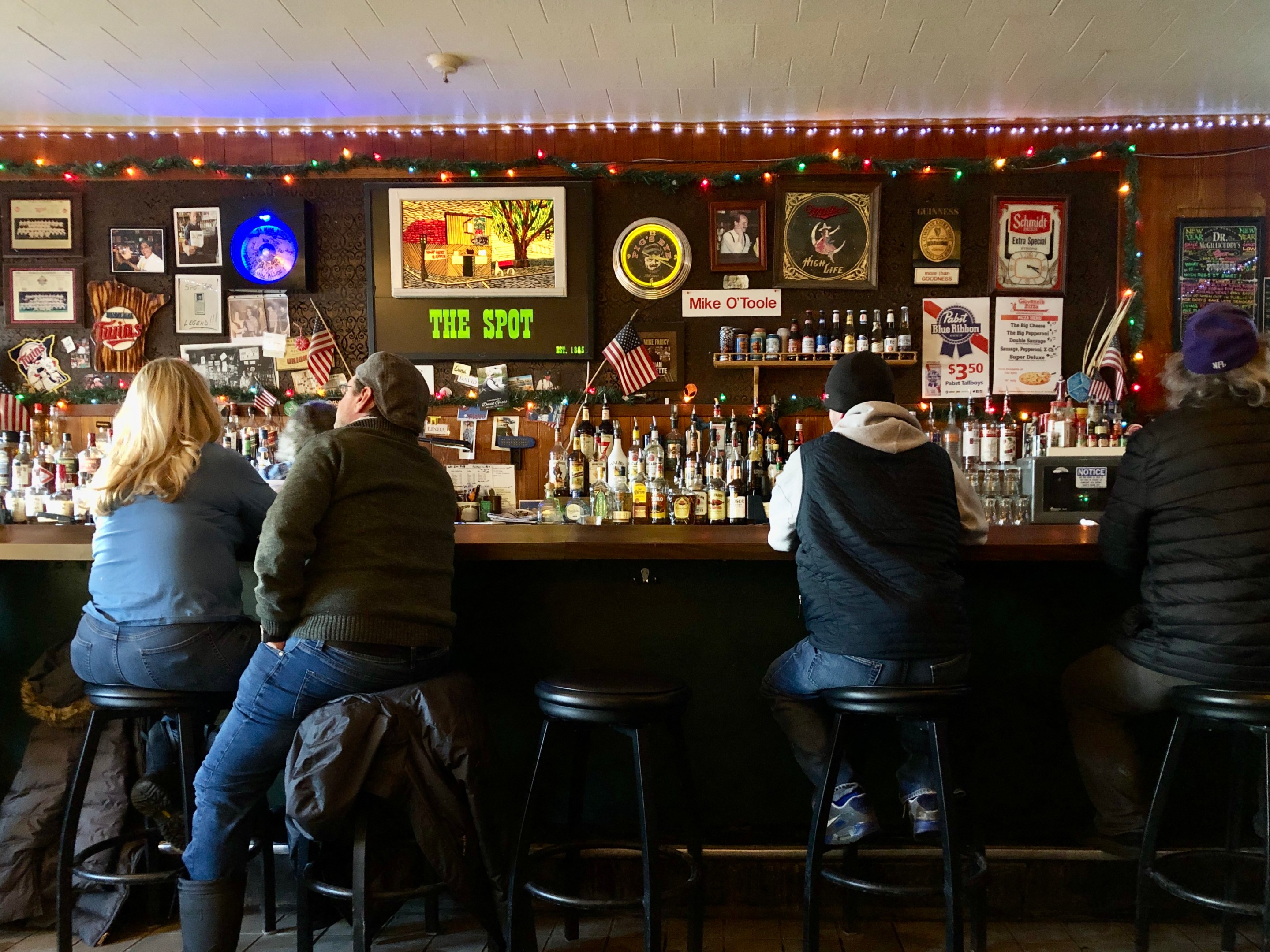After salty tapas and several glasses of tinto de verano, the bill arrived—and with it, one of the first of many misunderstandings I’d face during my semester in Spain.
I was sitting on a patio with my new roommate, Lisa, and her French parents, who had spared me a second successive lonely night by asking me out to dinner. Lisa and I could chat in Spanish, but her parents and I used rudimentary English, relying on huge smiles to smooth any gaps.
But when Lisa’s father, Antoine, called for the check, he knit his eyebrows and frowned. He fixed his gaze on me and carefully enunciated, “I invite you.”
I laughed, nervous and confused. That was nice of him to say, I supposed, but we had already shared a meal. Were we going somewhere else? I pantomimed gracious acceptance and decided to move on. When the check arrived, I pulled out my wallet and squinted at my euros.
“No,” Antoine interrupted my money-counting. “I invite you.”
I sensed his frustration and froze. Had I crossed some line? No—many awkward seconds later, I realized the man was trying to pay for my meal.
I graciously accepted, for real this time. But I have never forgotten the panic I experienced at “I invite you”: the moments when I dreaded alienating the only people who had shown me kindness in this unfamiliar country. Hospitable words and gestures, I learned, carry high relational stakes.
So when I returned to my job at a suburban Caribou Coffee months later, newly worldly and wise, I bristled at the manager’s edict that we call our customers “guests.” These were the perpetually late commuters who would stop for coffee and blame us for their delay. Most of them didn’t even enter the store, preferring the drive-through, where workers were forced to stand at the window and manufacture small talk in all seasons. As I rubbed my frozen hands together, mining the upcoming weekend for connection, “guest” felt more like “grovel.”
The term “guest” has supplanted “customer” throughout corporate America, thanks in part to Disney, which has compelled its staff to call park visitors “guests” since the 1950s. Customer service has largely become “guest relations.” In her early-pandemic–defining essay, Gabrielle Hamilton wrote, “For the past 10 years I’ve been staring wide-eyed and with alarm as the sweet, gentle citizen restaurant transformed into a kind of unruly colossal beast … [W]hat was once your ‘personality’ became your ‘brand,’ [and] the small acts of kindness and the way you always used to have of sharing your talents and looking out for others became things to ‘monetize.’”
Journalist William Zinsser rebuked this sort of puffery in 1976 in his guide On Writing Well: “We are a society strangling in unnecessary words, circular constructions, pompous frills and meaningless jargon … Our national tendency is to inflate and thereby sound important.”
Rick Anderson, the owner of France 44 Wines & Spirits in southwest Minneapolis, believes “guest” rings false in retail. “It seems to imply this reinforcement of hospitality,” he says. “But I really think it's just one of those winks [at hospitality] … it’s not genuine.”
“The term 'customer' got this negative connotation, and I don't understand that,” Anderson says. “Because when you are dealing with a customer, the relationship is clear. I, as a retailer, am providing some sort of service or product for compensation. The customer can expect that I will provide them this product or service under certain mutually agreed terms. I'm not going to lie to them; I'm not going to have special little secret upcharges.”
Instead of winking at hospitality, Anderson practices dignity and civility in his customer service. I know this because I worked for him in 2020, schlepping boxes of booze to open car trunks. To this day, France 44 holds the highest Google Reviews rating of any of my past or present employers: 4.8 out of 5 stars.
When I started working at one of my favorite Minneapolis restaurants in 2021, I was disappointed to re-encounter “guest.” The bar manager was the “beverage steward,” who conducted “check-ins,” not “performance reviews.” But the restaurant’s managers have encouraged us workers to stand up for ourselves and the integrity of our food. We don’t permit bad behavior or impractical substitutions. We serve delicious food and drinks in a beautiful, comfortable space. In an environment where authenticity beats groveling, can “guest” still be nefarious?
Kirk Martinson, the instructional technologist for languages at St. Olaf College and a former linguistics professor at the University of Minnesota and Hamline University, maps “customer” and “guest” onto the German words “Kunde” and “Gast.” A “Gast” is someone who stays in a hotel or attends a conference, he says. A “Kunde” is a bakery or fast food customer. While a “Kunde” transaction implies equal power dynamics—"I've got what you want, you've got the money,” Martinson quips—a Gast can expect to see deeper investment of time and subservience.
“Gast” is closely linked to dining in German-speaking countries, because traditionally, Gasthäuser (or “guesthouses”) hosted and fed travelers in rural areas. (German-speaking immigrants imported this word to Minnesota, opening Gasthaus Bavarian Hunter and the Black Forest Inn in the mid-1960s. Gasthof zur Gemutlichkeit served schnitzel and bratwurst in Northeast Minneapolis from 1992–2020.)
However, Martinson notes, customer service in Germany only goes so far. Until the mid-20th century, German had no word for “customer service.” Since the 1990s, “Kundenservice” has steadily gained popularity.
“American restaurants are much more about service than, say, German restaurants are. Because tips, right? Tips … theoretically, at least, should drive more friendly, personal service, ‘host’ kind of behavior,” Martinson says.
Benjamin Horn, 45, is one of the best servers I’ve ever met. Before he greets a table, he’ll circle the new arrivals a couple of times, surreptitiously reading their moods and personalities. “Are they really chatty?” he asks. “Have they not seen each other in a while? Are they feeling uncomfortable or out of place? How do I recenter them?” Then, he tunes his approach to the table’s vibe.
Good service is always personal, Horn says. So it’s interesting that his longest-held job has been at Blue Ribbon Brasserie, New York’s iconic late-night restaurant that did away with reservations and, Horn says, “broke down a lot of the ugly things about fine dining” in the 1990s. Instead of treating particular people as VIPs, he got to make everyone feel special, entertaining guests until 4 a.m.
Horn has more than 30 years of experience in restaurants and event management, having worked his way from a Bloomington, Minnesota, retirement home to a suburban Applebee’s, the downtown Minneapolis McCormick and Schmick’s, and in 2004, Blue Ribbon, where he bussed, served, and tended bar for 10 years. He managed the upstate branch of the Brooklyn-based Smorgasburg food market in the late 2010s and moved back to Minnesota near the beginning of the pandemic. At the turn of the millennium, the Twin Cities’ dining options were essentially limited to casual chains and steakhouses. Horn has been delighted by the range of original, high-quality yet approachable restaurants that have opened since.
“People aren't going to a restaurant just because they're hungry and they need to be fed,” he says. “If you go to a diner, you're a customer. You're going to McDonald's, you're a customer … On the other side of that, you have a restaurant that invests multiple million dollars in interior design and lighting and a fancy sound system and making sure that the menus look good. They spend so much money on things that aren't about the food at all—they're about creating an environment for you to enjoy some food, or to set up that experience … I think that's the difference. Now, you're a guest. You're a part of something. You're invited. Whether you choose to engage in that thing is up to you.”
If you visit a friend’s house and are offered homemade hot dish, grilled eel, or fruit brandy, you will likely accept—pending dietary restrictions—out of politeness, if nothing else. You’re in someone’s home; they’ve gone to some trouble on your behalf; and hopefully, you trust them. Horn and Anderson try to build similar relationships with their patrons. Anderson shares, “Every so often, a customer will say, 'You know what, I'm in a rut. I always buy this New Zealand Sauvignon Blanc. What else is there?' And that's the moment that they want to open up to a wider world of things.”
“Once they feel that welcome, you can take them on whatever journey you want,” Horn says. “‘Oh, you’ve never tried a Blaufränkisch? I have one you’re gonna love.’ You feel like, ‘Oh, it's almost like I'm in somebody's home.’”
Horn and Anderson both preach hospitality, but for Anderson, paying the bill and being a “guest” are mutually exclusive. “If I say, ‘My wife and I are going to a lake resort, and we've got this whole group of cabins up here. Why don't you come up and join us for this weekend as our guest,' you would not expect to be presented a part of the bill,” he says. “Because when you are invited as a guest, your expectation is that you will not have to pay.”
That’s the contradiction lurking within this shift from “customer” to “guest,” and Horn acknowledges it. “In a way,” he says, “a restaurant is really just a facade for a business. It's dressed up with all the marketing, and—from the font on the menu to the chandelier to the fake plant in the corner—this place is designed, like Disney World, to be this thing that you walk through and ooh and aah.”
But it doesn’t mean the ooh and aahs aren’t real. Horn, like thousands of other front-of-house workers, is also a musician and enjoys putting on a show. My restaurant employs theatermakers, singers, parents, a nursing student, and yes, writers, all devoting our time to human life and connection. We swap real energy with the people at our tables and bars.
Four months after Lisa’s family covered my meal, they invited my family and a third roommate’s family to dinner at their home in Angers, France. Sixteen people gathered around a long table, eating courses of homemade pâté, roast poultry, and cheese. Lisa’s uncle owns a Loire Valley vineyard, so of course Antoine uncorked a few special bottles. Jokes, translations, and sincere conversation soared over the table as our spirits warmed and loosened. It’s the closest I’ll ever get to Babette’s Feast.
That dinner defined hospitality for me, and I aim for it every time I greet a new table. The customer is rarely right, honestly, but their feelings tend to be valid. As long as they feel cared for and I get to keep my dignity, labels matter less than an excellent meal.
Benjamin Horn’s alternatives to “the customer is always right”
- We're in the business of saying yes. “We are in the business of saying yes; we are in the business of facilitating and saying ‘yes’ or ‘I'll see what I can do.’ I will do everything I can do to please whatever need you may have right now.”
- Perception is reality. “All of us are creating our own realities. Constantly. That's what our brain is designed to do … So if I feel like my drink has been taking too long, my drink has been taking too long. The customer’s reality is always real for them. [Front-of-house staff] need to find pathways to join a customer’s reality and what you and the restaurant can provide.”
- As Blue Ribbon manager Morgan used to say, it’s all about MPH. “Not miles per hour. Making people happy.”






